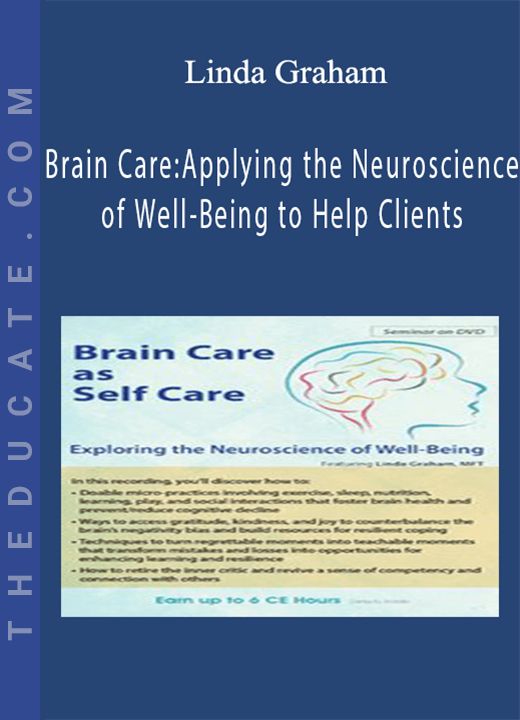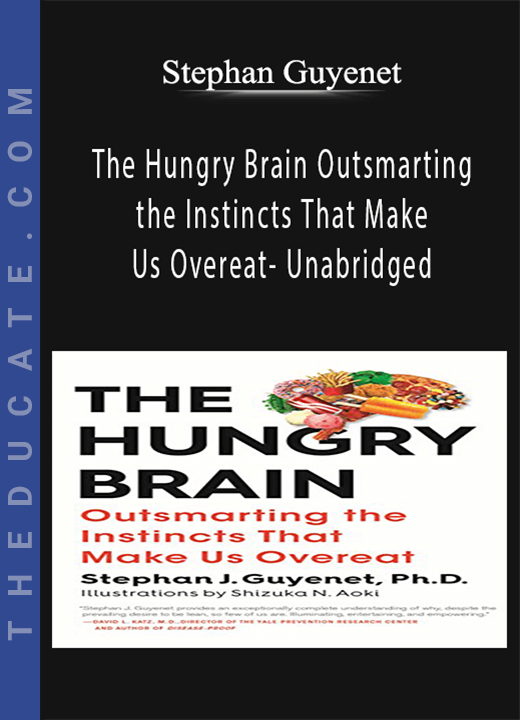Description
-
Linda Graham – Brain Care: Applying the Neuroscience of Well-Being to Help Clients
- Faculty:
- Linda Graham
- Duration:
- 4 Hours 54 Minutes
- Format:
- Audio and Video
- Copyright:
- Mar 22, 2017
Description
Even as we look to the latest brain research for techniques to apply in our therapeutic work, we too often neglect the damaging impacts of stress, poor lifestyle choices, and overstimulation from digital devices on our brains and bodies. In this recording, you’ll learn empirically-validated techniques to calm your client’s nervous system, help your client come to clarity in decision-making, heal toxic shame, and cultivate your client’s courage to take growth-enhancing risks.
Handouts
| ZNM052705 (0.39 MB) | 11 Pages | Available after Purchase |
Outline
- Brain structure, overlapping areas of physical pain, emotional pain and temperature
- Modalities impacting brain structure
Multiple approaches, experiences change the brain
Consciousness remains unexplained
Mindfulness, compassion
- Burnout and compassion fatigue
- Macro and micro approaches to self-care
- The impact of exercise on brain chemistry and development
Telomeres, longevity, types of movement
- The impact of sleep and rest on brain chemistry and development
Cognitive impairment, depression
Sleep improvement strategies
Brief restorative strategies
- Nutrition supports for brain function
MIND diet
Neurotoxins
Impact of obesity
- The role of play in sustaining healthy brain function
- Social relationships and well being
- The four intelligences of well being
- Body based tools for healing trauma
Reactivity and healing
Emotional regulation
- Priming the neuroplasticity of the brain
- Relational intelligence
- Mindful awareness
Modifying perceptions and reactions
- Exercise: Increasing somatic intelligence
- Exercises: Breath, posture and movement
- Positive psychology and neuroscience research
Contraction and reactivity
Resilience and health
Ability to shift perspective
Mindful self-compassion and acceptance
- Exercise: Hand movement, mindfulness and emotion
- Exercise: Visualization and self-compassion
- Exercise: Moments of kindness
- Exercise: Guided visualization toward self-acceptance
- Exercise: Playing Parts and self-integration
- Exercise: Integrating the inner critic
Faculty
Linda Graham, MFT Related seminars and products: 6
Linda Graham, MFT, is an experienced psychotherapist in the San Francisco Bay Area, bestselling author and international speaker. She integrates modern neuroscience, mindfulness practices, and relational psychology in her worldwide trainings. She is the author of Bouncing Back: Rewiring Your Brain for Maximum Resilience and Well-Being, winner of the 2013 Books for a Better Life award and the 2014 Better Books for a Better World award. She publishes a monthly e-newsletter, Healing and Awakening into Aliveness and Wholeness and weekly Resources for Recovering Resilience. For more information visit www.lindagraham-mft.net.
Linda draws on her own experiences of healing and awakening as well as more than two decades of integrative study, practice and teaching of transformational psychotherapies, vipassana meditation, life coaching, and facilitating groups and workshops to become a skillful guide interweaving many paths of compassionate, conscious connection. She is passionate about integrating the paradigms and practices of modern neuroscience, Western relational psychology and Eastern contemplative practice.
Speaker Disclosures:
Financial: Linda Graham is in private practice. She is an author for New World Library and receives royalties. Ms. Graham receives a speaking honorarium from PESI, Inc.
Non-financial: Linda Graham is an author of monthly e-newsletters.






11 reviews for Brain Care: Applying the Neuroscience of Well-Being to Help Clients – Linda Graham
There are no reviews yet.